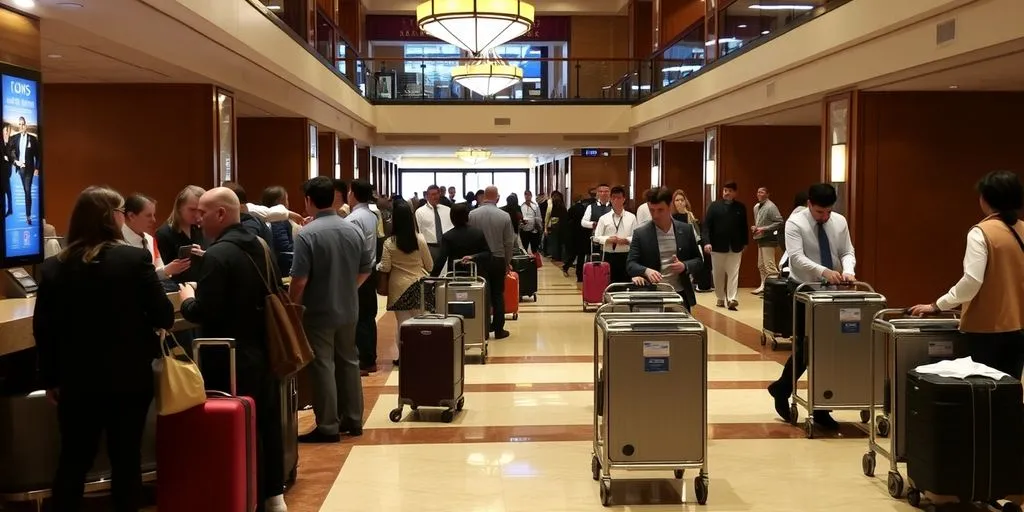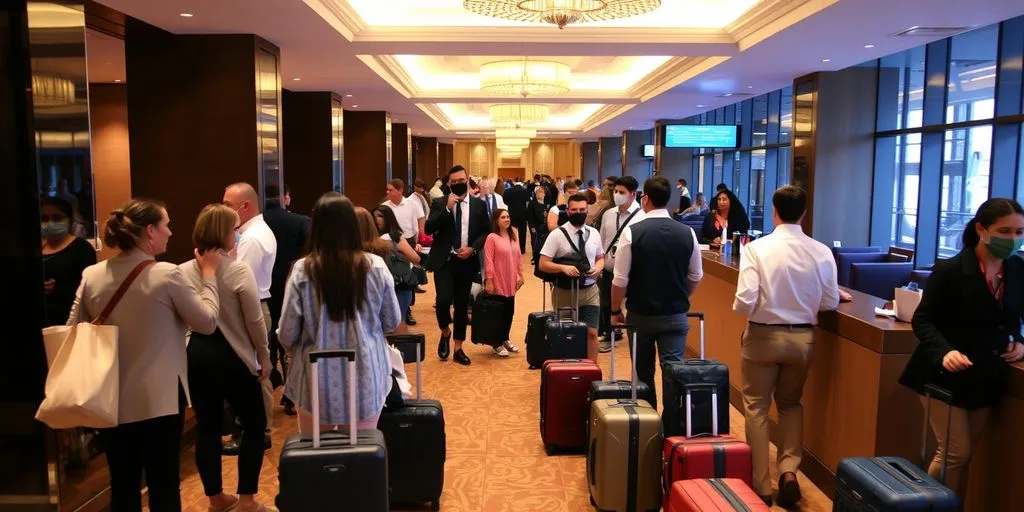September 17, 2024

The hospitality sector is on edge as it waits for the government to extend tax breaks. With the costs of goods rising and consumer spending slowing down, many businesses are feeling the pressure. The government's decision on tax breaks could make a big difference for the future of this industry.

Inflation has significantly impacted the hospitality sector, leading to higher costs for transportation, materials, energy, and salaries. Tourism and recreation businesses have seen growth slow as inflation erodes purchasing power and dampens consumer demand. This trend threatens the sector's outlook, with many businesses reporting a moderation in new activity.
The hospitality sector has experienced an unprecedented rise in input costs, with the sharpest rate of cost inflation in 24 years. This has forced nearly two-thirds of firms to raise prices, squeezing profit margins. The gap between input prices and prices charged has narrowed slightly but remains more than twice the pre-pandemic average, indicating continued pressure on profitability.
The long-term economic implications of inflation on the hospitality sector are concerning. Businesses are struggling to stay afloat, with many pausing or stopping trading altogether. The sector's ability to recover and thrive is at risk, highlighting the need for government intervention and support to ensure its survival.
The government has implemented various support measures to help the hospitality sector during challenging times. These include bounce-back loans, the furlough scheme, and other financial aids. These measures have been crucial in preventing many businesses from going bankrupt. However, some businesses have not been able to access this support due to specific policy parameters.
There are ongoing discussions about extending current tax breaks to further support the hospitality sector. The government aims to make these extensions simple and low-cost to ensure they are effective. This includes potentially extending the protection from eviction for businesses that cannot pay rent due to the pandemic.
The proposed extensions have sparked political and economic debates. Some argue that these measures are necessary to keep businesses afloat and protect jobs. Others believe that the focus should be on more targeted support, especially for those who have not been able to access existing schemes. The government is also considering the long-term economic implications of these extensions.
The hospitality sector is grappling with significant labour shortages. Many businesses are finding it hard to attract and retain staff, leading to increased wage pressures. This issue is compounded by the fact that a large portion of the workforce left the industry during the pandemic and have not returned.
Supply chain disruptions have become a major challenge for the hospitality industry. The pandemic has caused delays and shortages in essential supplies, from food ingredients to cleaning products. These disruptions have led to increased costs and have made it difficult for businesses to maintain their usual standards of service.
The hospitality sector often operates on a seasonal basis, with demand peaking during certain times of the year. This seasonal variation can make it difficult for businesses to plan and manage their resources effectively. For example, many hotels and restaurants in tourist areas struggle to stay open during the off-season, leading to financial instability.
Business leaders in the hospitality sector have expressed mixed feelings about the proposed tax break extensions. Some see it as a necessary lifeline to help them recover from the financial hit caused by the pandemic. They argue that these extensions could level the playing field with competitors in the sharing economy, such as Airbnb. However, others worry that the benefits might be short-lived if not paired with other support measures.
Trade associations like UKHospitality have been vocal about the need for these tax breaks. They believe that without this support, many businesses will be forced to close, especially those that have already seen their revenue halved during the crisis. They also stress the importance of avoiding double-taxation, which could further strain the sector.
Public opinion is generally supportive of extending tax breaks for the hospitality sector. Many consumers understand that the tourism industry generates £155 billion per year for the UK economy and that this contribution is at risk. There is a strong sentiment that the government should help struggling businesses survive, especially those that have been good but are now facing unprecedented challenges.
Extending tax breaks could help many businesses stay open through the winter months, providing much-needed income and stability. Without this support, the future looks bleak for many in the hospitality sector.

The retail and hospitality sectors face different taxation challenges. Retail businesses often deal with higher property taxes, while hospitality businesses are more affected by sales taxes and VAT. This difference can impact their profitability and pricing strategies.
Tourism and leisure businesses, including pubs and restaurants, have seen growth slow due to weaker consumer demand. Inflation has started to erode purchasing power, threatening the outlook for the sector. The pace of output growth has slowed, with firms reporting a moderation in new business activity.
Looking at international examples, some countries have successfully implemented tax breaks to support their hospitality sectors. For instance, in New Zealand, businesses in the accommodation and food services industry received significant support through wage subsidies and tax changes. This helped cover a large percentage of jobs in the industry, showcasing the potential benefits of well-targeted tax relief measures.
The hospitality sector can learn from international examples to better navigate economic challenges and maximise the benefits of tax breaks.
Economic experts predict that the hospitality sector will continue to face challenges due to weaker consumer demand and rising costs. The sector has seen growth slow, with inflation eroding purchasing power. This trend is expected to persist, making it crucial for businesses to adapt to the changing economic landscape.
Several potential scenarios could unfold for the hospitality sector:
To navigate these challenges, businesses in the hospitality sector can adopt several strategies:
The future of the hospitality sector hinges on its ability to adapt to economic changes and leverage available support measures effectively.
By staying updated on market trends and adopting innovative approaches, businesses can navigate the uncertainties and position themselves for long-term success.
Restaurants have been among the most proactive in leveraging tax breaks to stay afloat. For instance, a small chain of family-owned restaurants in Newcastle utilised the 'Help to Grow' initiative to expand their digital presence. This move not only helped them survive the pandemic but also allowed them to scale operations and adapt to digital changes. The initiative provided them with the necessary funds to upgrade their online ordering systems, which in turn boosted their revenue by 30%.
Hotels and pubs have also seen significant benefits from tax breaks. A notable example is a boutique hotel in London that took advantage of the government's bounce-back loans. These loans enabled the hotel to cover operational costs during the lockdown, ensuring they could retain their staff. The hotel also invested in refurbishing their premises, which attracted more customers once restrictions were lifted. As a result, their occupancy rates increased by 40% compared to the previous year.
Some businesses have adopted innovative strategies to make the most of tax breaks. A pub in Manchester, for example, used the funds from the Small Business Cashflow Loan Scheme to create an outdoor seating area. This not only complied with social distancing measures but also attracted more patrons during the summer months. The pub's owner reported a 25% increase in sales, attributing this success to the strategic use of the loan.
These case studies highlight how different segments of the hospitality sector have successfully utilised tax breaks to not only survive but thrive in challenging times.
The hospitality sector stands at a crossroads, facing both challenges and opportunities. With the potential extension of tax breaks, businesses may find some relief, but the road to recovery remains uncertain. The government's role in providing targeted support will be crucial in determining the future of pubs, restaurants, and hotels. As the sector braces for weaker consumer demand and rising costs, the resilience and adaptability of these businesses will be put to the test. The coming months will reveal whether the measures in place are sufficient to sustain the industry through these turbulent times.
Hospitality tax breaks are special financial incentives given by the government to support businesses in the hospitality sector, like hotels, restaurants, and pubs. These breaks help reduce the amount of tax these businesses have to pay.
Inflation is causing the costs of goods and services to rise. For the hospitality sector, this means higher prices for food, drinks, wages, and other expenses. As a result, businesses may have to charge more, which can reduce customer demand.
The government supports the hospitality sector through various measures like tax breaks, grants, and subsidies. These help businesses cope with financial challenges and encourage growth and stability.
Proposed extensions to tax breaks include continuing current tax relief measures and possibly introducing new ones. These extensions aim to help businesses recover from recent economic challenges and prepare for future uncertainties.
The hospitality sector faces challenges such as labour shortages, rising wages, supply chain disruptions, and seasonal demand variations. These issues can affect the profitability and sustainability of businesses in the sector.
Industry leaders have mixed reactions to the proposed tax break extensions. Some welcome the support, while others feel it may not be enough to address all the challenges the sector faces. Trade associations and public opinion also play a role in shaping these reactions.